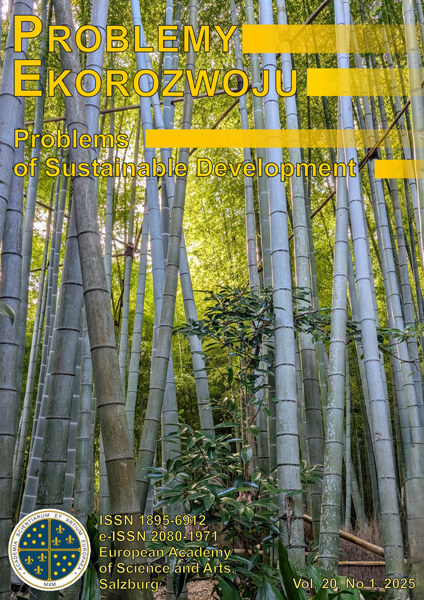A Three-dimensional Aproach in Education for Sustainable Future
Živilė Sederevičiūtė-Pačiauskienė
Vilnius Gediminas Technical University, Saulėtekio 11, Vilnius, 10223, Lithuania (Lithuania)
Viktorija Žilinskaitė-Vytienė
Vilnius Gediminas Technical University, Saulėtekio 11, Vilnius, 10223, Lithuania (Lithuania)
Ilona Valantinaitė
Vilnius Gediminas Technical University, Saulėtekio 11, Vilnius, 10223, Lithuania (Lithuania)
Abstract
The concept of sustainable development is used in a growing number of new contexts (ever-modernising technologies, developing science, environmental protection, politics) and levels (global, regional, national, institutional, personal). The concept differs depending on an area in which it is used. Business, technologies and politics use typical, already existing approaches to sustainable development. The projection/transposition of sustainable development paradigm into the sphere of education, science, technologies, economy, environmental protection and politics acquire the specifics of a sphere, namely structure and terminology, and has different elements. A wide field of human activity and different levels of the implementation of the concept of sustainable development make the analysis of this development and its implementation in the education sector more difficult. Both scientific and practical educational discourse need common parameters, common dimensions which unify the different areas of sustainable development and allow educators to accurately convey a full picture of this development. In this article, we will highlight educational approach towards a sustainability paradigm by analysing the common dimensions of sustainable development. We will talk about the levels of the implementation of sustainable development by concentrating on education at a personal level. Having applied the triangle of the dimensions of sustainable development (Place, Permanence, Persons), created by L. Seghezzo, to explain and analyse the concept of quality of life, in the article, we will present a three dimensional model of education for sustainable development.
Keywords:
sustainability, sustainable development, quality of life, educationReferences
ADKINS B., FOTH M., SUMMERVILLE J., HIGGS P., 2007, Ecologies of innovation – Symbolic aspects of cross-organizational linkages in the design sector in an Australian inner-city area, in: American Behavioral Scientist, vol. 50, no 7, p. 922-934.
Google Scholar
COHEN-ROSENTHAL E., 2004, Making sense out of industrial ecology: a framework for analysis and action, in: Journal of Cleaner Production, vol. 12, no 8-10, p. 1111-1123.
Google Scholar
COTTLE S., 2004, Producing nature(s): on the changing production ecology of natural history TV, in: Media Culture & Society, vol. 26, no 1, p. 81-101.
Google Scholar
Darnaus vystymosi darbotvarkė iki 2030 metų, 2015, https://sustainabledevelopment.un.org/post2015/transformingourworld (22.06.2016).
Google Scholar
DIENER E., SUH E., 1997, Measuring quality of life: economic, social and subjective indicators, in: Social Indicators Research, vol. 40, p. 189-216.
Google Scholar
FLORIDA R., 2002, The Rise of Creative Class. And how it’s transforming work, leisure, communitiy and everyday life, Basic, New York.
Google Scholar
FROMM E., 1976, To Have or to Be? The nature of the psyche, Harper & Row, New York.
Google Scholar
HUCLE J., 2012, Towards a greater realism in learning for sustainability, in: Learning for Sustainability, p. 35-48, http://john.huckle.org.uk/download/2958/LfSChapterOne2012.pdf (10.07.2016).
Google Scholar
HUGHES M., 2006, Affect, Meaning and Quality of Life, in: Social Forces, vol. 85, no. 2, p. 611-629.
Google Scholar
KAČERAUSKAS T., 2016, Discourses of Ecology and the Sketches of Creative Ecology in the Context of Sustainable Development, in: Problemy Ekorozwoju/ Problems of Sustainable Development, vol.11, no.1, p. 31-39.
Google Scholar
KOHLBERG L., 1984, The Psychology of Moral Development. Nature and Validity of Moral Stages, Harper and Row, San Francisco.
Google Scholar
MASLAW A.H., 1954. Motivation and personality, Harper & Bros., New York, in: Seghezzo, 2009.
Google Scholar
O‘CONNOR J., 1998, Natural Causes. Essays in Ecological Marxism, Guilford, New York.
Google Scholar
PACE P., 2010, Education for sustainable development: current fad or renewed commitment to action? In: Journal of Baltic Science Education, vol. 9, no. 4, p. 315-323.
Google Scholar
PAWŁOWSKI A., 2009, How many dimensions does sustainable development have?, in: Sustainable Development, vol. 16 no 2, p. 81-90.
Google Scholar
PAWŁOWSKI A., 2011, Sustainable Development as a Civilizational Revolution. Multidimensional Approach to the Challenges of the 21st century, CRC Press, Taylor & Francis Group, A Balkema Book, Boca Raton, Londyn, Nowy Jork, Leiden.
Google Scholar
SEGHEZZO L., 2009, The five dimensions of sustainability, in: Enironmental Politics, vol.18, no. 4, p. 539-556.
Google Scholar
SPRINGETT D., 2016, Education and the Problems of Sustainable Development, in: Problemy Ekorozwoju/ Problems of Sustainable Development, vol. 11, no 1, p. 7-14.
Google Scholar
Study Protocol for the World Health Organization Project to Develop a Quality of Life Assessment Instrument (WHOQOL) (1993). Quality of Life Research, vol. 2, no. 2, p. 153-159, http://www.jstor.org/stable/4034396 (21.08.2016).
Google Scholar
The World Summit on Sustainable Development. People, planet, prosperity, 2002, http://ec.europa.eu/environment/archives/wssd/documents/wssd_brochure.pdf (21.08.2016).
Google Scholar
WCED (World Commission on Environment and Development), 1987, Our Common Future (Brundtland Report), Oxford University Press, New York.
Google Scholar
ZOLLER U., 2015, Research-Based Transformative Science/ STEM/ STES/ STESEP Education for Sustainability Thinking. From: Teaching to ‘Know‘ to Learning to ‘Think‘, in: Sustainability, vol 7, no. 4, p. 4474-4491.
Google Scholar
Authors
Živilė Sederevičiūtė-PačiauskienėVilnius Gediminas Technical University, Saulėtekio 11, Vilnius, 10223, Lithuania Lithuania
Authors
Viktorija Žilinskaitė-VytienėVilnius Gediminas Technical University, Saulėtekio 11, Vilnius, 10223, Lithuania Lithuania
Authors
Ilona ValantinaitėVilnius Gediminas Technical University, Saulėtekio 11, Vilnius, 10223, Lithuania Lithuania
Statistics
Abstract views: 34PDF downloads: 7
License

This work is licensed under a Creative Commons Attribution-ShareAlike 4.0 International License.




